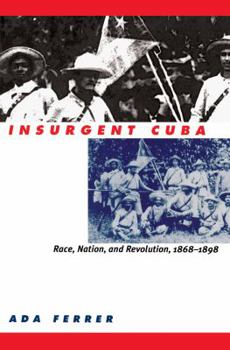Insurgent Cuba: Race, Nation, and Revolution, 1868-1898
Select Format
Select Condition 
Book Overview
In the late nineteenth century, in an age of ascendant racism and imperial expansion, there emerged in Cuba a movement that unified black, mulatto, and white men in an attack on Europe's oldest empire, with the goal of creating a nation explicitly defined as antiracist. This book tells the story of the thirty-year unfolding and undoing of that movement.
Ada Ferrer examines the participation of black and mulatto Cubans in nationalist insurgency from 1868, when a slaveholder began the revolution by freeing his slaves, until the intervention of racially segregated American forces in 1898. In so doing, she uncovers the struggles over the boundaries of citizenship and nationality that their participation brought to the fore, and she shows that even as black participation helped sustain the movement ideologically and militarily, it simultaneously prompted accusations of race war and fed the forces of counterinsurgency.
Carefully examining the tensions between racism and antiracism contained within Cuban nationalism, Ferrer paints a dynamic portrait of a movement built upon the coexistence of an ideology of racial fraternity and the persistence of presumptions of hierarchy.
Ada Ferrer examines the participation of black and mulatto Cubans in nationalist insurgency from 1868, when a slaveholder began the revolution by freeing his slaves, until the intervention of racially segregated American forces in 1898. In so doing, she uncovers the struggles over the boundaries of citizenship and nationality that their participation brought to the fore, and she shows that even as black participation helped sustain the movement ideologically and militarily, it simultaneously prompted accusations of race war and fed the forces of counterinsurgency.
Carefully examining the tensions between racism and antiracism contained within Cuban nationalism, Ferrer paints a dynamic portrait of a movement built upon the coexistence of an ideology of racial fraternity and the persistence of presumptions of hierarchy.
Format:Paperback
Language:English
ISBN:0807847836
ISBN13:9780807847831
Release Date:October 1999
Publisher:University of North Carolina Press
Length:288 Pages
Weight:0.99 lbs.
Dimensions:0.7" x 6.1" x 9.3"
Customer Reviews
1 rating
Pathbreaking work on race and revolution
Published by Thriftbooks.com User , 25 years ago
Insurgent Cuba tracks the transformation of racial and gendered narratives of the revolution from the abolition of slavery to the war of independence. In this fascinating and pathbreaking book, Professor Ferrer reveals that, with the emergence of late 19th century Cuban nationalism, narratives of race, slavery, and the place of black people in the revolution shift dramatically. Through the voices of leaders like Jose Marti, black insurgents were constructed as color-blind patriots committed to the liberation of Cuba, not slaves and ex-slaves attempting to overthrow the regime of slavery and demand equal rights. Black people were transformed in these three decades from a problem and threat to the republic to the symbols of Cuban nationalism's commitment to multiracial democracy. Anti-racism became a weapon in the hands of Cuban revolutionaries in their battle against Spain, which changed the status of black insurgents, put them on a pedestal in a way, and made their stories fundamental to the narrative of the new republic--one that is colorblind and willing to incorporate everyone as long as they are patriots. For blacks and mulattoes, this discourse gave them a platform to complain about racism in the ranks of the army, in everyday life, everywhere. On the other hand, the ellision of racism in the discourse of Cuban nationalism and the celebration of multiracial republicanism was often used against critics of racism in Cuba. "To speak of race, then," Ferrer writes, "was to challenge the depth of racial and national unity." Any attempts to mobilize on the basis of racial solidarity was then dismissed as divisive and unpatriotic. By reconstructing these different narratives in the context of specific revolts and campaigns, Ferrer offers us a stunning alternative narrative of the struggle for Cuban Independence. Insurgent Cuba is perhaps the best book available on race and Cuba.





